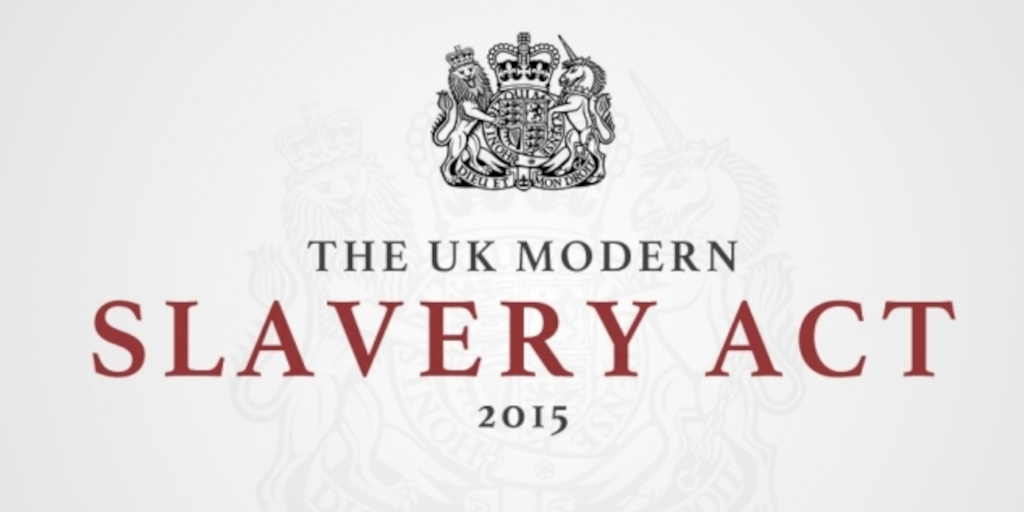
Modern Slavery is a serious and often hidden crime in which people are exploited for criminal gain. In 2015 the UK government introduced the Modern Slavery Act which is aimed at combating crimes of slavery and human trafficking and recognises that businesses have a role to play in tackling these crimes.
Section 54 of the Modern Slavery Act requires large commercial organisations with a global turnover above £36 million to publish a slavery and human trafficking statement every financial year. The statement must disclose what steps the organisation has taken to ensure that human trafficking is not taking place in any of its supply chains or its business; or state that it has taken no such steps. This aims to ensure that businesses are transparent about what they are doing to tackle modern slavery and human trafficking.
What is modern slavery?
Modern slavery comprises slavery, servitude, forced and compulsory labour and human trafficking. The Home Office research has identified four broad ways in which victims of modern slavery may be exploited. These are:
- Labour exploitation – which usually involves unacceptably low pay and inadequate working conditions plus control over the victims meaning they have no choice but to carry out the work.
- Domestic servitude – when victims are working in a private family home under poor working conditions who are often underpaid, ill-treated and feel they cannot leave their job.
- Sexual exploitation – when victims are coerced into sex work or sexually abusive situations.
- Criminal exploitation – when people are forced to commit crimes for someone else’s’ gain.
The common factors with all kinds of modern slavery are that a victim is, or is intended to be, used or exploited for someone else’s (usually financial) gain, without respect for their human rights. The perpetrators seeking to take advantage of them could be private individuals, running small businesses or part of a wider organised crime network. For adult victims, there will be some element of coercion involved, such as threats, use of force, deception, or abuse of power.
Freedom from slavery in the supply chain
As stated above, large commercial organisations that carry on business in the UK and have a total turnover of £36 million or more must prepare a slavery and human trafficking statement for financial years ending on or after 31 March 2016. These statements must be:
- Approved by the company board –To ensure senior level accountability, the statement must be approved by (and signed by one of):
- For companies, the board of directors.
- For LLPs, the members.
- For partnerships, the partners
It is also best practice for the statement to include the date on which the board, members or partners approved the statement.
- Published on the company’s website – There should be a link to the statement in a prominent place on the organisation’s homepage. The aim is to ensure that the statement is easily accessible by anyone who wants to see it. The Home Office guidance says that the link should be directly visible on the homepage or part of an obvious drop-down menu, and clearly marked so that the contents are apparent.
- Updated every year – each year an organisation should assess whether their organisation meets the criteria for the preceding financial year. If so, they must publish a modern slavery statement within 6 months of their financial year-end (and it should reference the date its financial year ended).
What should be in the statement?
The Home Office’s statutory guidance recommends that organisations cover the following six areas in their statement:
- Organisation structure and supply chains
- Policies in relation to slavery and human trafficking
- Due diligence processes
- Risk assessment and management
- Key performance indicators to measure effectiveness of steps being taken
- Training on modern slavery and trafficking
Organisations are not expected to guarantee that all their supply chains are ‘slavery free’. However, statements must describe the steps an organisation has taken during the financial year to deal with modern slavery risks in their supply chains and business and the detail and quality of information included under each of the six areas should improve in successive annual statements. The Government has produced the following guidance for organisations on how to ensure that slavery and human trafficking is not taking place in their business or supply chains (https://www.gov.uk/government/publications/transparency-in-supply-chains-a-practical-guide).
If an organisation has taken no steps to deal with modern slavery risks, they must still publish a statement setting this out. Anyone interested in viewing statements can use the government registry to search for organisations’ statements and view the summaries they have provided.
Enforcement
There is no criminal enforcement. The Secretary of State may enforce the duty to prepare a slavery and human trafficking statement in civil proceedings by way of injunction (or in Scotland, by specific performance of a statutory duty). If the organisation then fails to comply with the injunction, it will be in contempt of a court order and that would be punishable by an unlimited fine. Many commentators have sought a much tighter regulatory regime including:
- Criminal penalties for failing to report as required.
- The creation of a central database of company reports.
- Clearer duties of reporting to describe the steps of due diligence undertaken by the company in making its assessment of the supply chain risks of modern slavery it has identified.
The Home Office has also published the National Enforcement Powers Guide, a guide to the legal powers that can be used to tackle modern slavery.
Future developments
The Modern Slavery (Transparency in Supply Chains) Bill 2017 had its first reading in the House of Lords on 12 July 2017. If enacted unamended the Bill will introduce the following measures:
- Mandatory reporting of information – requiring organisations to publish their statements on a government website.
- The statement to include information on why the organisation has taken no steps to address modern slavery in its supply chain.
- A duty on the Secretary of State to publish an easily accessible list of all commercial organisations required to publish a slavery and human trafficking statement.
- The disqualification of companies from being awarded public contracts where they have failed, as required, to prepare a slavery and human trafficking statement.
It is therefore an area that is likely to be subject to greater scrutiny and tighter regulation in the future, which makes it even more important for organisations to be aware of their obligations and responsibilities regarding modern slavery.
Further Information
If you have any questions regarding the above or require any assistance, please do not hesitate to contact Anne-Marie Pavitt or Sophie Banks on +44 (0)333 122 0010.




